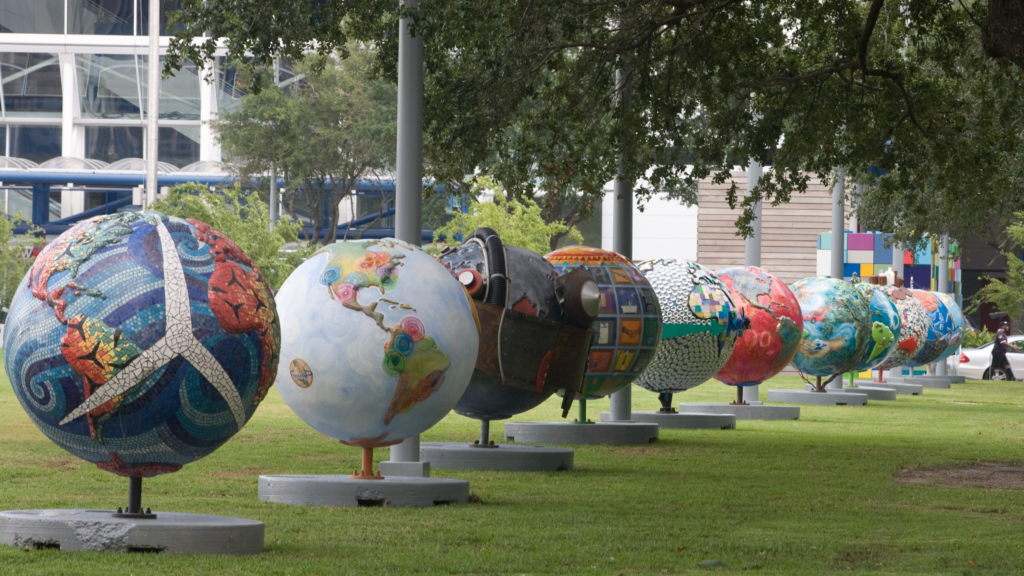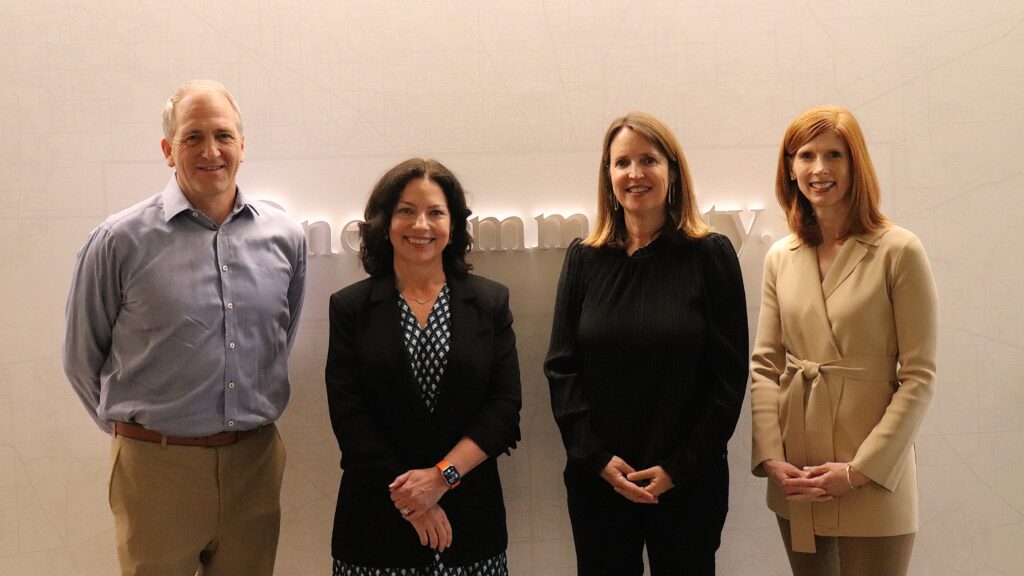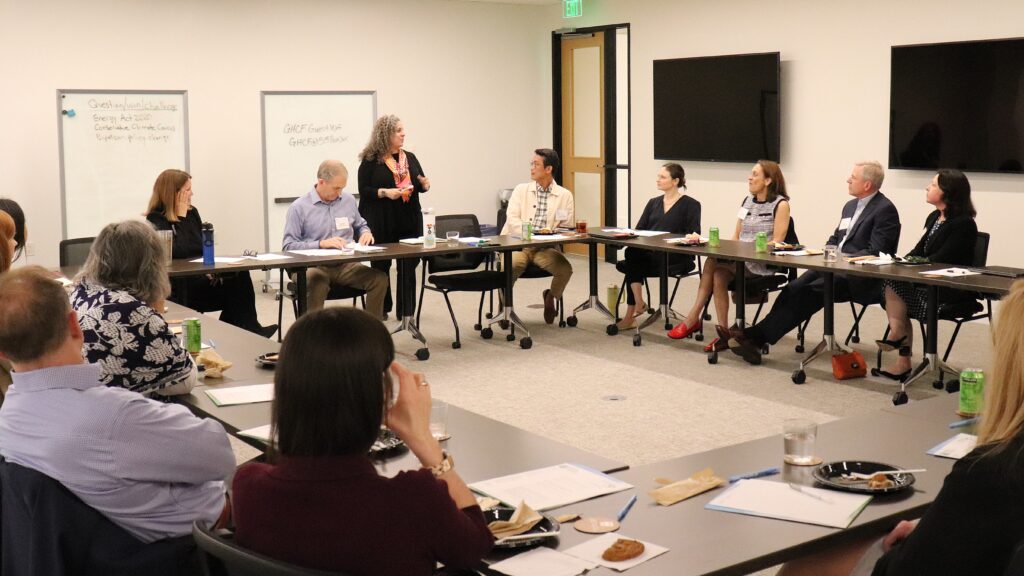Exploring Climate Philanthropy: Insights from Peer Leaders

Randall Kempner, Executive Director of the Climate Philanthropy Catalyst Coalition, provided a snapshot of the global and national landscape of climate philanthropy, followed by a peer learning discussion featuring Jenny Everett, Cullen Geiselman Muse, Elizabeth Love, and other attendees, who shared stories of their own involvement in climate philanthropy.
When it comes to climate philanthropy and environmental protection, there are numerous buzzwords, including climate mitigation, carbon sinks, and resiliency. In today’s rapidly changing environment, both literally and figuratively, climate philanthropy can be daunting for donors to navigate. While some of the sustainability or environmental challenges may seem insurmountable, this discussion equipped “climate-curious” philanthropists with many useful tips and connections, including how and where to find well-vetted climate-focused organizations and good questions to ask when seeking ways to invest in promising solutions.
At Greater Houston Community Foundation (Foundation), our mission is to empower donors to make informed decisions that not only resonate with their values but also advance their objectives in impactful and meaningful ways.

Setting the National Context
Randall Kempner shared how, in general, philanthropists recognize that climate is a critical issue area, stating that climate philanthropy increased by 20% from 2022 to 2023, with many new collaborations and commitments from billionaires and other large funders. However, despite this new funding, Kempner noted that climate philanthropy still accounts for less than two percent of the nation’s total philanthropic dollars.
Kempner discussed how numerous organizations are working in this space, but it is imperative that philanthropists focus on supporting models with a proven track record of success. Kemper shared that foundations that engage in this space have reported that they do not feel like they are being effective overall. He also shared that while 60 percent of foundation executives consider climate change one of the top three issues facing the world today, philanthropic dollars in this area remain sparse. This highlights that, although many philanthropists recognize the climate crisis, their funding has not necessarily increased in this area.
Stories and Strategies from Texas-Based Climate Philanthropists
Activism in Austin
Jenny Everett, fundholder and Next Gen alum, shared how she enrolled in the Next Gen Donor Institute at Greater Houston Community Foundation, despite being based in Austin, to help her sharpen her philanthropic strategy. One thing that quickly surfaced as being important to her was deploying funds to organizations with a climate focus.
When starting to channel her support in this space, it was hard to discern which nonprofits to support given the multitude of climate challenges and the array of nonprofits doing great work. She came across One Point Five Climate Strategies Group, a nationally recognized donor collaborative that focuses on identifying various climate solutions and mobilizing the necessary resources to scale these solutions.
During this time, Jenny realized that no climate-focused group of philanthropists existed in Austin. It was also around this time that Kempner had updated data to share, but there was no organic group in Central Texas to share it with. This was the catalyst that fueled her to help establish the Central Texas Climate Philanthropy Collaborative. This collaboration led to the formation of the Central Texas Action Fund, a field of interest fund at Austin Community Foundation, which aims to increase climate-focused philanthropy in Central Texas. In its inaugural year, this fund granted $160,000, which included some matching dollars! Although they are still small, they are figuring out how to scale this work.
Nurturing Nature
Elizabeth Love spoke about the Jacob and Terese Hershey Foundation’s (Hershey Foundation) approach to environmental justice and conservation. Love shared how the Hershey Foundation values work that centers the vision and voices of those most impacted. The Hershey Foundation invests in efforts to mitigate climate change and reduce harmful emissions, protect and steward land and water resources, and improve habitats and recover species of concern. The Hershey Foundation supports advocacy initiatives, community organizing, legal strategies, and on-the-ground conservation. In addition, the Hershey Foundation is open to considering short-term bridge loans for mission-aligned projects, such as land conservation initiatives that meet certain criteria.
Love shared that Texas is the number one emitter of greenhouse gases in the United States, and Harris County is one of the top greenhouse gas emitters in the country. Love also shared how the Hershey Foundation’s investment portfolio aligns with its mission.
Widening the Circle of Climate Philanthropists
Cullen Geiselman Muse, fundholder and Foundation Governing Board member, spoke about her work on various nonprofit boards. She believes that organizations require strong organizational governance if they want to last for a long time, and she has experience and expertise in good governance and board leadership. This belief motivates her to support and get involved with organizations ranging from the Houston Advanced Research Center to Rainforest Trust. She gravitates towards organizations that simultaneously conserve species while preserving the climate, and discussed the importance of attracting more people and funding to conservation efforts. She believes in the inspiring power of nature, and people’s interest in preserving nature and animals can help broaden the number of philanthropists at the table in climate discussions because they are so interconnected.

Make Your Philanthropic Vision a Reality
As we navigate our communities’ challenges and their far-reaching impacts, partnering with the Foundation can amplify your efforts and ignite meaningful change in the causes you care about most. Whether you are passionate about renewable energy, art initiatives, or innovative educational programs, we support your vision. Together, we can harness the power of philanthropy to create and strengthen communities and foster resilience in the face of today’s challenges. If you’re a philanthropist interested in learning more about how you can contribute to this impactful work, we invite you to connect with Greater Houston Community Foundation today at 713-333-2210 or reach out directly.
Resources
Each panelist expressed how environmental issues intersect with every other issue area—from poverty to healthcare and education. Below is a list of resources mentioned by our speakers to help people conduct diligence in their climate philanthropy research. This list is not exhaustive, but it includes resources mentioned in this discussion.
Activate Houston – An organization that supports scientists researching ways to reinvent our economy to be sustainable and resilient.
Clean Energy Fund of Texas – An organization that aims to reduce greenhouse gases and finance energy efficiency, weatherization, and water conservation.
Climate and Energy Funders Group – A network of foundations that fund in the field of climate and energy.
DEPLOY/US – An organization accelerating bipartisan climate leadership.
Giving Green – A vetted and rigorously researched list of climate charities.
Greentown Labs – A community of climate tech pioneers working on designing a more sustainable world.
Jacob & Terese Hershey Foundation Recent Grants – A list of recent environmental justice and conservation organizations that the Hershey Foundation has supported.
One Point Five Climate Strategies Group – A nationally recognized donor collaborative that is focused on identifying a comprehensive range of impactful climate solutions and mobilizing the necessary resources to rapidly catalyze and scale up these solutions
Powerhouse Texas – An organization educating and cultivating bipartisan energy policy leaders who will promote energy innovation, security, and sustainability.
Texas Climate and Energy Funders Group – An annual convening that dives into the tools that will be key to climate progress in Texas in the coming years.
Yale Program on Climate Change Communication – A framework for talking with six unique audiences within the American public that each responds to the issue in their own distinct way.
Speaker Bios

Jenny Everett
Jenny Everett is a creative problem solver and strategic thinker with over twenty years’ experience leading and advising non-profit and philanthropic organizations. As a colleague, consultant, and board member, she is known for her ability to establish a vision, forge key relationships, and successfully execute. Her specialties include network and ecosystem building, non-profit management, and philanthropic advising. Interest areas include small and growing businesses and entrepreneurship, alternative forms of ownership (particularly perpetual purpose trusts), international development, social impact, gender lens investing, and an increasing focus on climate.
Jenny is currently a Social Impact Advisor with Everett Interests and a co-founder of the Purpose Trust Ownership Network (PTON) and the Central Texas Climate Philanthropy Collaborative. She is a board member of FUNDES, Goodwill Central Texas, ONOW, Pollinate Impact, and Village Capital and an active member of Social Venture Partners Austin. She is also a Corey Rosen Fellow at the Institute for the Study of Employee Ownership & Profit Sharing at the Rutgers School of Management and Labor Relations
She is the former Managing Director of the Aspen Network of Development Entrepreneurs (ANDE) a program of the Aspen Institute. In this role, she helped to grow ANDE from a fledgling idea to a robust network of over 300 organizations operating in 150 emerging market countries. She led the launch of Regional Chapters in the Andean region, Brazil, Central America/Mexico, East Africa, East and Southeast Asia, India, South Africa and West Africa and managed ANDE’s international team.
Prior to ANDE, she was the Senior Program Manager, Membership and Individual Donors at Hispanics in Philanthropy. She has also worked with DoubleClick in San Francisco and the Concha y Toro winery in Santiago, Chile. During business school, she worked with Agora Partnerships in Nicaragua, Enterprise Solutions for Poverty in New York, and Investors’ Circle in San Francisco. She has an MBA from the NYU Stern School of Business, where she received the Impact Award for Social Innovation and Impact and the Stern School Service Award, and a BA in Latin American Studies from Davidson College.

Cullen K. Geiselman Muse, PhD
Cullen K. Geiselman Muse, PhD, is a conservationist, philanthropist, and bat researcher. She lives and works in Houston where she chairs the board and is the acting director of the Cullen Trust for Health Care, a support organization funding healthcare initiatives in the greater Houston area. She also serves on the Board of Directors of the Houston Zoo, the Houston Arboretum and Nature Center, the Houston Parks Board, the Houston Advanced Research Center, the Greater Houston Community Foundation, the Turtle Conservancy, the Lone Star Coastal Alliance, and the Blaffer Art Museum at University of Houston. After working for Bat Conservation International, later serving as Chair of the Board of Directors, and completing her dissertation on nectar-feeding bats in French Guiana, Ms. Geiselman continues her work with bats by collaborating with students and researchers in Africa and Latin America, curating the online Bat Eco-Interactions database (www.batbase.org), and presenting lectures about bats to technical audiences and the general public. Cullen received a BA in Environmental Science and Policy from Duke University and MA and PhD in Ecology and Evolutionary Biology from Columbia University and co-authored the book Seed Dispersal by Bats in the Neotropics with botanists from The New York Botanical Garden. She is dedicated to conserving species and the habitats they need to thrive and to preserving and expanding green space for the benefit of people and nature.

Randall Kempner
Randall Kempner is the founder and executive director of the Climate Philanthropy Catalyst Coalition, a network of philanthropic support organizations dedicated to promoting more, and more effective, climate philanthropy. He is also the president of Prosperity Strategies, a consultancy focused on sustainable economic development and philanthropy.
Randall recently worked as Senior Advisor to the Aspen Institute Energy and Environment Program, where he focused on “climate-smart money”, the intersection of climate action and philanthropy, investment, and economic development. While at Aspen, he authored a guide for climate philanthropists: Funding Climate Action: Pathways for Philanthropy. Previously, he was CEO of the Cynthia and George Mitchell Foundation, a Texas-based grantmaking foundation that seeks innovative solutions for environmental problems. He is the founding executive director of the Aspen Network of Development Entrepreneurs, a global network of organizations focused on supporting small and growing businesses in emerging markets.
Randall graduated from the University of Texas at Austin with an MBA and a Master of Public Affairs and earned his bachelor’s degree in government from Harvard College. He presently serves on the advisory boards of the United States Millennium Challenge Corporation and the LBJ School of Public Affairs. He is a co-founder of the Central Texas Climate Philanthropy Collaborative and board chair of the Harris and Eliza Kempner Fund, a place-based family foundation in his hometown of Galveston, Texas.

Elizabeth Love
Elizabeth Love serves as CEO of the Jacob and Terese Hershey Foundation, which supports those working boldly toward a healthy environment, reproductive justice, and the nurture of nature. Prior to joining the Foundation in 2020, she served as Senior Program Officer at Houston Endowment, where she led environmental and health-related initiatives for 11 years. Before joining Houston Endowment, Elizabeth served as Director of Harris County Public Health’s Office of Policy and Planning, overseeing the department’s strategic planning, legislative affairs, community-based assessment processes, and outcomes evaluation framework. In the late 1990s, Elizabeth served as a fellow for the U.S. Centers for Disease Control and Prevention. Elizabeth received a Bachelor of Arts degree from Rice University and a master’s degree from the University of Texas School of Public Health. Elizabeth currently serves on the boards of LINK Houston, Commission Shift and The Funders Network, as well as on the Advisory Board of the School of Social Sciences at Rice University.
More Helpful Articles by Greater Houston Community Foundation:
- Global Giving: Empowering Change Beyond Borders
- Nonprofit Workshop Series: Innovations in Disaster Preparedness
- 30 Ways We Amplify Giving
- Where High-Impact Philanthropy Happens: A Personalized Approach to Giving
This website is a public resource of general information that is intended, but not promised or guaranteed, to be correct, complete and up to date. The materials on this website, including all comments and responses to comments, do not constitute legal, tax, or other professional advice, and is not intended to create, and receipt or viewing does not constitute, nor should it be considered an invitation for, an attorney-client relationship. The reader should not rely on information provided herein and should always seek the advice of competent legal counsel and/or a tax professional in the reader’s state or jurisdiction. The owner of this website does not intend links on the website to be referrals or endorsements of the linked entities.